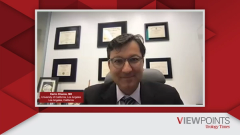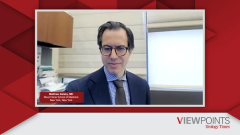
Treating Bladder Cancer in Community Settings
Administration of systemic therapy and management of side effects in patients with bladder cancer.
Episodes in this series

Leonard G. Gomella, MD: I think Karim you make a good point. Traditionally, the urologists are not comfortable with these infusions. Certainly, we’re very comfortable with intravesical therapies but one of the things I think we have to keep in mind is that with immuno-oncology there’s a whole new panel of potential side effect profiles—pneumonitis and GI [gastrointestinal] issues and pituitary issues and things like that. I do think that we’re going to have to be very mindful for this as we go forward. To follow up on that theme a lot of these immunotherapies that we now have in advanced bladder cancer are systemically administered. I’d like Petros to talk about in his clinic, in his medical oncology work, who really does the infusions? Are they always supervised by the medical oncologist and given by the advanced practice provider? How is your daily infusion of immunotherapy in your practice?
Petros Grivas, MD, PhD: Thanks so much Len and great discussion so far. I appreciate the comments by you, Sam, and Karim. When it comes to systemic therapy infusions, I think the medical oncologist has a major role and our colleagues in urological oncology refer to patients to medical oncologists for any systemic therapy including chemotherapy, immunotherapy, targeted therapy, so on and so forth. One of the main reasons is we have this academic context here and we have additional clinics but in terms of operationalizing and managing the administration of systemic therapies and with the side effects, I think the team here recognized that the medical oncologist has the resources and treatment to, and starts to deal with management of side effects that may happen from systemic therapies.
In terms of your great question about the logistics and the operations of administration, there are many medical oncologists, people who may see the patient, meet, evaluate, assess, discuss all the options, risks, benefits, alternative options, rationale, the data. A decision is made with the patient in an informed and fair decision manner and the patient embarks on systemic therapy, then infusions can take place. In those subsequent infusions an advanced practice provider and nurse practitioner or a physician assistant can see the patient before each administration and evaluate the patient in terms of symptoms, history, physical exam, and laboratory findings and if they feel the patient needs systemic therapy they can go ahead.
When it comes for a scan review, a restating CT of the chest, abdomen, and pelvis, I think with IV [intravenous] contrast, if that’s possible, then the attending medical oncologist sees the patient to do the scan review. In between, there is a continuous communication, I would say, between the practice provider and the medical oncologist and the nursing. It’s a team approach, we have team huddles, and we discuss every patient every week. We can anticipate, predict what might be needed, and also react to any types of side effects. Sometimes patients may come in on [INAUDIBLE] in order to be evaluated for a possible side effect. The last point I will make is we have a close communication with our infusion room and clinic. Like every other cancer center, we try to create space and time so we’re extending the hours in the weekdays including weekends to provide more capacity in the infusion room. And, of course, discussion with the infusion room nurses have a very important role in the administration of systemic therapy.
Leonard G. Gomella, MD: Sam, certainly in the community setting there’s a lot more infusion being done. I think in most academic medical centers, I think most of us sort of have an agreement with medical oncology that they do most of the infusions and we handle some other aspects. What do you think the trend is going to be with urologists and infusions, particularly in the large urology groups out in the community?
Sam S. Chang, MD, MBA: I think that’s an excellent question, Lenny. I think the large group practices are clinicians; they’re not just urologic surgeons. They provide care for patients. In terms of who is going to be giving the medications, I think in those large group practices, as long as individuals understand, gain the knowledge, gain the importance of careful evaluation, follow up recognition of possible symptoms, therapies for possible side effects associated with immunotherapy, I think there’s going to be a continued trend to include immunotherapy in its IV formulation. Perhaps in the future there will be subcutaneous formulations to provide the medications and treatment alternatives for these patients.
I think the large group practices also understand the importance of a relationship ongoing with medical oncologists, and to be honest, some of those large group practices, as you know, have incorporated oncologists themselves within the group practice to help care for these patients. I think there’ll be a trend towards more large urology practices to do systemic therapy, but I think it will be very limited in scope in terms of who will be actually doing it. Those advanced practice providers would be an essential part of that team as well.
Transcript edited for clarity.
Newsletter
Stay current with the latest urology news and practice-changing insights — sign up now for the essential updates every urologist needs.







